Stewkley Wildlife Reserve
Wildlife Reserve News for July 2011
24th July, Sunday, the past
week has been cooler with rain showers, in the reserve there are quite
a few Selfheal now in flower, (photo below left), and while some Yellow
Rattle is still in fower, most has gone to seed, right photo below,
which also shows a Yellow Meadow Vetchling.
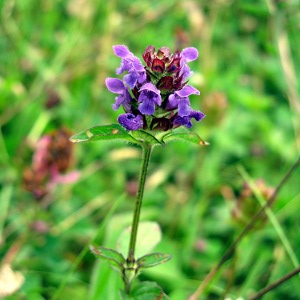
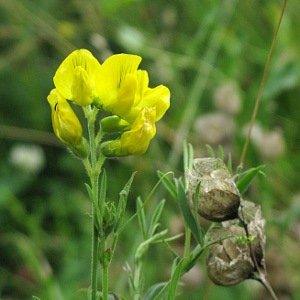
There are very few butterflies about, the Marbled White and Large White, were all I saw last week.
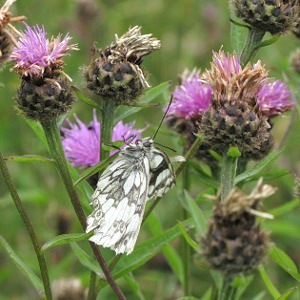
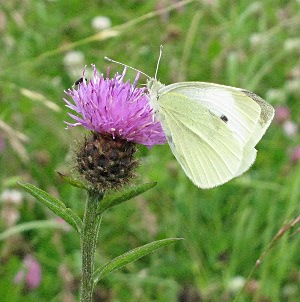
However I did spot a few 7 spot Ladybirds, which I expect everyone recognises, so I thought I would include a close up, which shows the mandibles of this creature, which it used to grab and eat greenfly, and other garden pests.
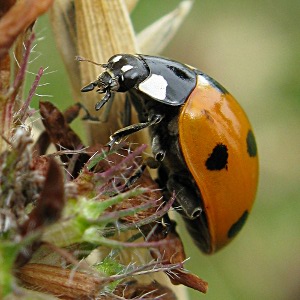
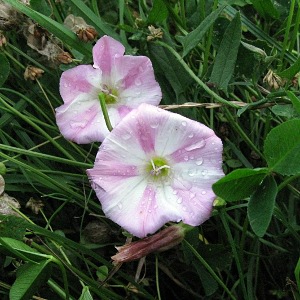
The other photo on the right above, shows a Convolvolvus, or more commonly know as Field Bindweed, quite a pretty flower, but thought by most gardeners to be a real problem, on account of the difficulty of eradicating it from borders, and vegetable plots, however many different insects are attracted to its flowers.
17th July, Sunday, yesterday about an inch of rain fell, which was welcome after the low amounts of rain we have had this year.
In the reserve Goldfinches were to be seen eating the seeds from the seed heads of those Knapweed that have finished flowering. Many of the Vetches have also gone to seed, their seed pods being like pea pods, initially they are green, but as they ripen the pods turn black, then split open to allow the seeds to fall out onto the ground, to hopefully grow into a new plant next year. (Picture right below).
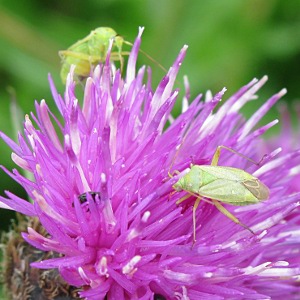
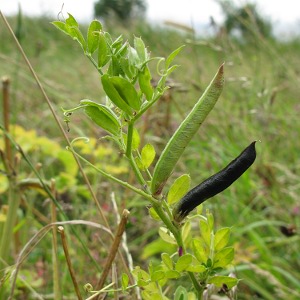
It was wet, there were a few Grasshoppers chirping, and a Small Copper butterfly was seen, along with a few white moths. On a Knapweed head I noticed some Capsid bugs, which are generally an enemy of the gardener, eating leaves of various plants. (picture above left)
14th July Thursday, A couple more plants have been spotted, the one on the left is Spiny Restharrow, that on the right is a more well known plant the Rose Bay Willowherb.
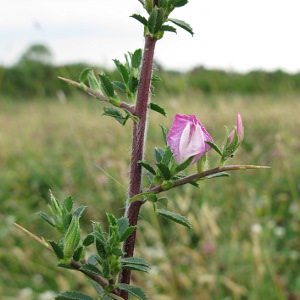
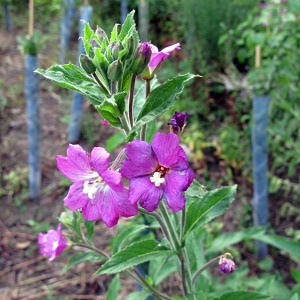
3rd July, Sunday, A group of about 16 people, gathered at the reserve to join a conducted tour, led by Matt Dodds, Biodiversity Officer for AVDC. Matt praised the work that Alan has done, in developing the site, to the advantage of wildlife in the area. His talk was very informative, talking about many of the plants, butterflies, and other aspects of the reserve.
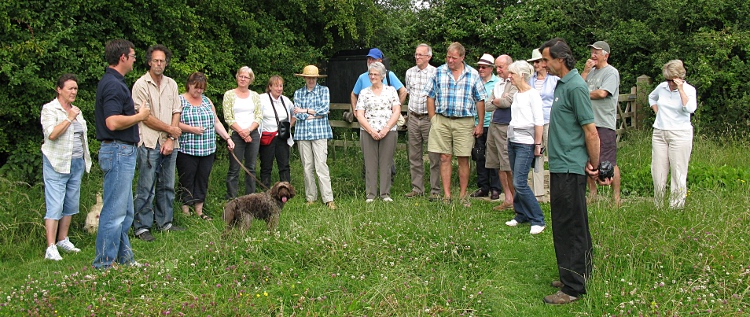
2nd July, Saturday, A nice sunny day and there were a few butterflies about mostly Meadow Brown, with some Ringlet, a few White, and a couple of Marbled White
1st July, Friday, during a walk around last evening, we found that Field Scabious, and Small Scabious had started to flower in Old Churchfurlong, they are both pale blue flowers on long stalks, and look very similar. On the right the Hawkbit flower is host to many Pollen Beetles, there are also some on the Scabious in the left picture, they also invade garden flowers, but are mostly more a nuisance than doing any damage.
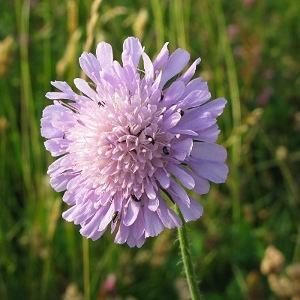
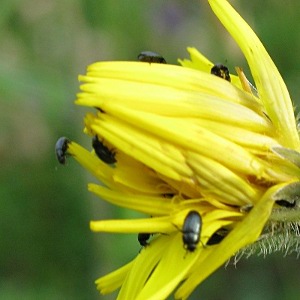
There are many seed heads of the Goats Beard, which upon closer examination shows what an amazing arrangement the plant has to disperse the seeds. There are not actually many seeds on each seed head, for each one has a fully formed 'parachute' that the wind can catch and carry the seed some distance, to enable the plant to grow in some other location.
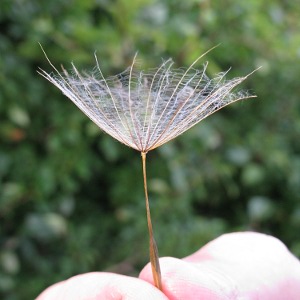
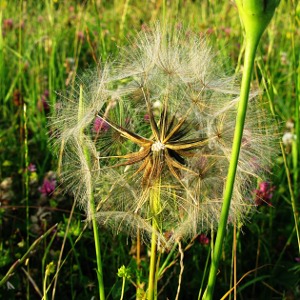


There are very few butterflies about, the Marbled White and Large White, were all I saw last week.


However I did spot a few 7 spot Ladybirds, which I expect everyone recognises, so I thought I would include a close up, which shows the mandibles of this creature, which it used to grab and eat greenfly, and other garden pests.


The other photo on the right above, shows a Convolvolvus, or more commonly know as Field Bindweed, quite a pretty flower, but thought by most gardeners to be a real problem, on account of the difficulty of eradicating it from borders, and vegetable plots, however many different insects are attracted to its flowers.
17th July, Sunday, yesterday about an inch of rain fell, which was welcome after the low amounts of rain we have had this year.
In the reserve Goldfinches were to be seen eating the seeds from the seed heads of those Knapweed that have finished flowering. Many of the Vetches have also gone to seed, their seed pods being like pea pods, initially they are green, but as they ripen the pods turn black, then split open to allow the seeds to fall out onto the ground, to hopefully grow into a new plant next year. (Picture right below).


It was wet, there were a few Grasshoppers chirping, and a Small Copper butterfly was seen, along with a few white moths. On a Knapweed head I noticed some Capsid bugs, which are generally an enemy of the gardener, eating leaves of various plants. (picture above left)
14th July Thursday, A couple more plants have been spotted, the one on the left is Spiny Restharrow, that on the right is a more well known plant the Rose Bay Willowherb.


3rd July, Sunday, A group of about 16 people, gathered at the reserve to join a conducted tour, led by Matt Dodds, Biodiversity Officer for AVDC. Matt praised the work that Alan has done, in developing the site, to the advantage of wildlife in the area. His talk was very informative, talking about many of the plants, butterflies, and other aspects of the reserve.

2nd July, Saturday, A nice sunny day and there were a few butterflies about mostly Meadow Brown, with some Ringlet, a few White, and a couple of Marbled White
1st July, Friday, during a walk around last evening, we found that Field Scabious, and Small Scabious had started to flower in Old Churchfurlong, they are both pale blue flowers on long stalks, and look very similar. On the right the Hawkbit flower is host to many Pollen Beetles, there are also some on the Scabious in the left picture, they also invade garden flowers, but are mostly more a nuisance than doing any damage.


There are many seed heads of the Goats Beard, which upon closer examination shows what an amazing arrangement the plant has to disperse the seeds. There are not actually many seeds on each seed head, for each one has a fully formed 'parachute' that the wind can catch and carry the seed some distance, to enable the plant to grow in some other location.


